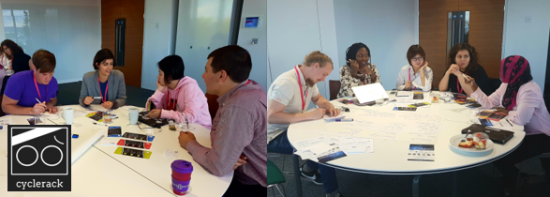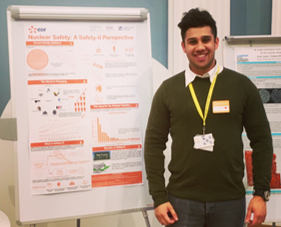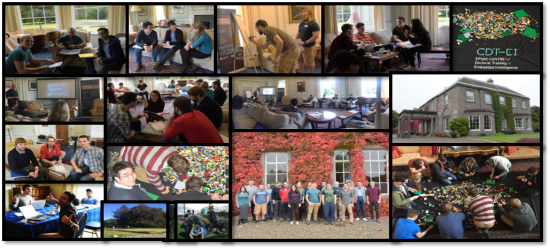Report by Cohort 4 researcher, Luke Wilkinson
I attended the inaugural West Midlands Seminar for the Oil & Colour Chemists Association (OCCA) at the Ricoh Arena, Coventry on Monday 16th October. It aimed to bring industrial partners and academia together to discuss the latest advancements in the coatings sector. Established in 1918, the OCCA has been a leading association in accrediting work and encouraging partnerships within the coatings sector. The seminar had four guest speakers from a variety of backgrounds and companies.
The first speaker was from Tremco and was titled ‘Fire Prevention’. The presentation began with many statistics on fire, with the most interesting being that it would take less than 4 minutes to fill a 6 metre cubed room with smoke through a hole the size of a pencil. This has lead companies to strive to compartmentalise buildings to prevent the spread of fire and smoke, leading to intense research into finding materials to plug holes in walls around windows, doors, electrical cables and pipes. Tremco manufacture passive fire prevention techniques and give their products ‘fire prevention ratings’ E30, E60, E120, E180 and E240, which are the minutes they can withstand a temperature increase of +140 degrees compared to ambient temperature. An interesting point from this talk was that certain fire prevention materials are well suited to only a small number of uses. For example, polyurethane foam is able to have an E240 rating for horizontal and vertical joints between bricks and concrete, but if used to fill a larger hole, e.g. 200mmx200mx150mm, it only withstands heat for 5 minutes before combusting and failing. I found this talk extremely interesting and informative. There was a good balance of case studies and how they affect the processes and testing undertaken by the chemical industry.
SurfaChem gave a talk on titanium dioxide and its changing uses over recent years. TiO2 is used in sun cream to prevent the harmful effects of UV. In the USA, skin cancer is classified as a disease, and as sun cream prevents this disease, it is certified as a drug by the FDA. In the EU, sun cream is classified as a cosmetic product and is subject to different laws. The nano form of TiO2 is often used in sun creams. The concerns about the use of nanotechnology were raised, including can the nanoparticles be inhaled, and as TiO2 is not naturally occurring in humans, can it be excreted. Issues around labelling were also raised, and the example of paraben was cited; people stopped using paraben based on a medical report, yet it was still used in Calpol, and were still giving it to children. The point about risks and benefits outweighing each other were discussed, and what the chemical industry can do to label chemicals in a way that does not cause panic among consumers. This talk was very informative and opened my eyes to the considerations the chemical industry has to take when developing products and how they are labelled and marketed.
A short coffee break followed to allow for networking opportunities, and discussions with companies with table top displays.
The third speaker was from Altana and was titled ‘Using Laponite for Unique Rheology Modification Properties’. Laponite is a synthetic inorganic layered structure based on an octahedral arrangement of lithium and magnesium and a tetrahedral arrangement of sodium and silicon. It can be dispersed in water to form a gel. It has a unique rheology that allows sheer thinning viscosity. The delegate explained the applications of laponite, which mainly consisted of allowing pigments in paint to be suspended evenly and allow a better distribution of colour and there was a demonstration of multi-coloured paints and how laponite is key in ensuring different colours in paints aimed at replicating materials such as granite do not mix. Other applications of laponite involve wood coatings and coatings in the automotive industry. The talk was well structured, and offered a good insight into an industrial company and the work they do in the coatings sector.
The final speaker was from the company Samuel Banner and was about Biocides and related challenged. It was explained that biocides are chemicals added to coatings that are there to fight off fungal growth on or within the coating. There was a lot of information on the legislation to do with certification and how the industry needs to label their chemicals. One interesting point was that if a company makes a claim, for example, ‘kills 99% of bacteria’, it costs over £2 million to make that claim, and they have to back it up within 2 years of submitting it. This was the most challenging talk of the day to understand as there were a lot of acronyms without definition hence I felt it was aimed at the industry experts and did not engage enough with people from outside the direct circle of biocides.
All in all, it was a positive first experience at a conference. There were many important things the industrial world has to consider within chemistry which were highlighted and I can now reflect upon these when I am doing academic lead chemistry. It was also good to gain my first experience in networking opportunities.









